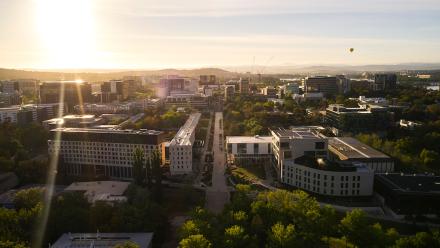Changing the game in climate action
It is the responsibility of people from my generation to support the emerging generation and get out of their way. We have to change the game, we can鈥檛 keep doing the same things that we have been doing over the past generations.
Rebecca Blackburn believes living a simpler life not only makes us happier, but is also great for the environment. She is now ready to examine this belief through research.
"We need a fundamental change to the way our society is structured and how we think about things," says Rebecca.
She is the inaugural recipient of the Game Change Supplementary Scholarship at the 黑料天堂Institute for Climate, Energy and Disaster Solutions (ICEDS). The scholarship supports PhD scholars from the emerging generation, particularly those from Indigenous communities, rural and remote areas of Australia and Pacific Island Countries. The scholars are encouraged to undertake an integrated, cross-disciplinary approach to climate change solutions.
Rebecca's research will focus on driving behavioural change to reduce consumption and its associated impacts. In particular, she will examine whether living a minimalist life actually leads to better climate and environmental outcomes.
"The impacts of minimalism are often self-reported, but with little focus on measurement. So that's what I want to do - actually measure the ecological footprint of a minimalist lifestyle," says Rebecca. "The good news is that there is evidence to suggest that living more simply makes us happier."
The scholarship is supported by the Game Change Fund, which was founded by Graham Waters, Anne-Marie Waters (GDStats '88, GDPoplnHealth '96) and Ray Kiley (BSc '84, LLB '85). They want the fund to be a 'game changer' for both the recipients and the research.
Graham believes it is very important for the older generation to support the emerging generation of scholars, especially from the Indigenous community and Pacific Islanders.
"They are going to be living with the impact of climate change much longer than we are," says Graham. "Also, they are very passionate about it. It is the responsibility of people from my generation to support them and get out of their way.
"We have to change the game, we can't keep doing the same things that we have been doing over the past generations."
While it was Graham's idea to set up the Game Change Fund, Ray was one of the early donors and played a key role in partnering with ICEDS to set up the scholarship.
"We see the fund as an opportunity for the donor community to help change the world and help prevent the impending disaster caused by climate change," says Ray.
Rebecca is extremely grateful to ICEDS and the Game Change Fund for the opportunities the scholarship has made available to her.
"As a result of the scholarship, I will be able to access an extensive network of experts in academia, government and industry," says Rebecca.
"My aim is for the information I gather throughout my studies to be translated into policy, and in this way be used to influence positive societal changes."


